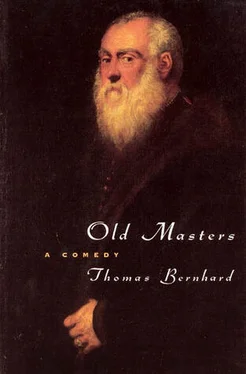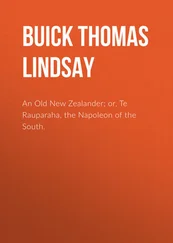Everybody has his bread-giver, he said hypocritically,
my bread-giver is The Times. It is good to have a bread-giver, it is even better to
have a secret bread-giver. The Times is my secret master, he said yesterday. I had been observing him for a long time now without actually seeing him. He said yesterday that naturally he did not have every opportunity but certainly a great many opportunities in his childhood, and during his youth which followed upon his childhood, and that in the end he had not decided in favour of any one of those opportunities as a professional career. As he had been under no compulsion to earn a living, since what he had inherited from his parents was not to be underrated; he had for many years, undisturbed, followed only his ideas, his predilections, his inclinations. From the outset it had not been nature that attracted him, on the contrary, he had avoided nature whenever he could do so, art had attracted him,
anything artificial, he said yesterday,
absolutely anything artificial. Painting had disappointed him at an early stage, from the outset it had seemed to him the unspiritual among the arts. He read a lot, and passionately, but the idea of writing himself never occurred to him, he did not think he could do it. He loved music from the outset, it was in music that he eventually found what he had missed in painting and also in literature. I certainly do not come from a musical family, he said, on the contrary, my people were all unmusical and altogether completely hostile to the arts. Only after my parents died was I able to indulge in my first predilection. My parents had to be dead for me to be able to do what I wanted to do, they had always blocked my access to my predilections, to my passions. My father was an unmusical person, he said, my mother was musical, as I believe, even highly musical, but her husband over the years had
driven her musicality
out of her. My parents were a
frightful couple, he said, they secretly hated one another but were unable to separate. Possessions and money held them together, that is the truth. We had many beautiful, expensive paintings hanging on our walls, he said, but they never looked at them once in all those decades, we had many thousands of books on our shelves but they never read a single one of those books in all those decades, we had a Bösendorfer grand piano standing there but for decades no one had played it. If the lid of the piano had been welded shut they would not have noticed it for decades, he said. My parents had ears but they heard nothing, they had eyes but they saw nothing, they probably had hearts but they felt nothing. Amidst that chill I grew up, he said. I did not suffer any hardship, but even so I was in the depths of despair every single day, he said. My whole childhood was nothing but a period of despair. My parents did not love me and I did not love them. They never forgave me for having made me, all their lives they never forgave me for having made me. If there is a hell, and of course there is a hell, he said, then my childhood was that hell. Childhood probably always is hell, childhood is
the hell, he said, no matter what kind of childhood, it is hell. People say they had a happy childhood, but it was hell all the same. People falsify everything, they also falsify the childhood they had. They say they had a happy childhood, and yet they lived through hell. The older people become the more readily they say they had a happy childhood when it cannot have been anything other than hell.
Hell does not lie ahead, hell is behind us, he said,
because hell is childhood. What it cost me to escape from that hell! he said yesterday. While my parents were alive it was hell for me. My parents blocked everything within me and about me, he said. In a ceaseless mechanism of suppression they nearly protected me to death, he said. My parents had to be dead for me to be able to live, when my parents died I revived. In the end it was actually music that vivified me, he said yesterday. But of course I did not wish, nor was I able, to be a creative or even a performing artist, at least not a creative or performing musical artist, but only a
critical one.
I am a critical artist, he said, I have been a critical artist all my life. Even in childhood I was a critical artist, he said, the circumstances of my childhood made me a critical artist in an entirely natural way. I certainly regard myself as an artist, that is as a critical artist, and as a critical artist I am of course also creative, that is obvious, hence a
performing and creative critical artist, he said. What is more, a creative and performing critical artist of
The Times, he said. I certainly regard my brief reports for
The Times as works of art, and I think that as the author of these works of art I am always in one person and simultaneously a painter and a musician and a writer. That is my greatest delight: to know that as the author of these works of art for
The Times I am a painter and a musician and a writer in one, that is my
greatest delight. I am not therefore, as the painters are, only a painter, and I am not, as the musicians are, only a musician, and I am not, as the writers are, only a writer, you must understand that
I am a painter and a musician and a writer all in one. That is what I perceive to be the greatest happiness, he said, to be
an artist in all the arts and yet reside in one of them. It is possible, he said, that the critical artist is the one who practises his own art in all the arts and is aware of it, utterly and totally aware of it. This awareness makes me happy. To that extent I have been happy for over thirty years, he said, even though by nature I am an unhappy person. A thinking person is by nature an unhappy person, he said yesterday. But even that unhappy person can be happy, he said, time and again, in the truest meaning of the word and of the concept
as a diversion. Childhood is the black hole into which one was thrust by one's parents and from which one must climb out unaided. Most people never succeed in getting out of that black hole which is their childhood, all their lives they are in that black hole, they cannot get out and they become embittered. That is why most people are embittered who fail to get out of the hole of their childhood. It certainly calls for a superhuman effort to get out of the hole of childhood. And unless we get out of that blackest of holes at an early stage we never get out of it at all, he said. My parents had to be dead for me to get out of that blackest hole of my childhood, he said, they had to be
definitely dead, in fact for ever, you understand, for me to get out of the hole of my childhood. What my parents would have liked best was, immediately after my birth, to have locked me up in their safe along with their jewellery and their bonds, he said. I had embittered parents, he said, who suffered all their lives from their bitterness. In all the pictures I have of my parents, and whenever I look at them, I see their bitterness. There are practically no other children than children of embittered parents, that is why all parents look
so embittered. All these faces are marked by bitterness and disappointment, you scarcely find any that are not, you may walk through Vienna for hours on end, for instance, and all you see in those faces is bitterness and disappointment, and things are no different out in the country, the country faces too are full of bitterness and disappointment. My parents made me, and when they saw
what they had made they had a shock and would have preferred to unmake me. And as they could not put me in their safe they thrust me into that black hole of childhood, from which I could not emerge while they were alive. Parents invariably produce their children in an irresponsible manner, and when they see what they have produced they have a shock, that is why, whenever children are born, we see only shocked parents. To produce a child and, as the hypocritical phrase goes, bring it into the world is nothing other than bringing grave unhappiness into the world and it is this grave unhappiness that always shocks them anew. Nature has ever made fools of parents, he said, and out of these fools it produces unhappy children in dark holes of childhood. Without any embarrassment people say they have had a happy childhood, whereas in fact they had an unhappy one, from which they only escaped by a supreme effort, and for
Читать дальше












